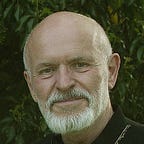Ernest Hemingway — William Faulkner Speaks Out: Cuba 1947
Hemingway is Awarded the Bronze Star & Two Mrs Hemingways Meet
Mary and Hemingway had the Finca to themselves in the early months of 1947 and were looking forward to Ernest’s two youngest sons arriving. But on a visit to their mother both Patrick and Gregory were involved in a car crash, and although Gregory recovered quickly Patrick began to complain of headaches. The two boys then set off to Cuba, but soon after they arrived Mary was called away to Chicago where her father had been taken seriously ill with prostate cancer.
On the morning of the 14th of April Patrick became feverish and delirious, and by the evening had turned violent. Ernest diagnosed neglected concussion. He quickly turned the Finca into a hospital and his staff into a team of nurses with each of them taking turns to watch over Patrick, with Hemingway taking the midnight watch. On the 16th Pauline arrived and took control of the Finca, and her son’s health. Hemingway reported to Mary that his ex-wife was behaving admirably. Pauline stayed until the 10th May when Patrick was well enough to be left.
Mary returned to Cuba on the 18th of May completely exhausted. She just wanted to sleep. Five days later Pauline reappeared, and much to Ernest’s surprise the two Mrs Hemingways got on very well and amused him with some banter about their attendance at the Hemingway University.
But it was becoming obvious to both Mary and Pauline that Hemingway was exhausted too and showing signs of nervous strain that exploded into rage when he read in the press that fellow novelist, William Faulkner, had called him a coward.
William Faulkner had said nothing of the sort of course. When talking with some students at the University of Mississippi Faulkner had said that Wolfe, Dos Passos, Erskine Caldwell, Hemingway, and himself were the best modern novelists around, but that they were all victims of what he called, ‘splendid Failure’. According to Faulkner Thomas Wolfe had made the best failure because his courage was greatest, and he had risked clumsiness, and even dullness, in order to shoot the works, win or lose, and damn the torpedoes. Jon Dos Passos had sacrificed some courage, said Faulkner, to the demands of style, and that Hemingway stood last on the list because he…
